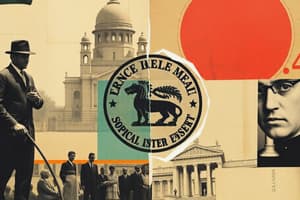Podcast
Questions and Answers
What is one of the options available to a person who cannot pay their debts?
What is one of the options available to a person who cannot pay their debts?
- Luxury shopping spree
- Entrepreneurship program
- Real estate investment
- Bankruptcy (correct)
Which legislation amended the Insolvency Act 1986?
Which legislation amended the Insolvency Act 1986?
- Consumer Protection Act 1990
- Bankruptcy Relief Act 2010
- Enterprise Act 2002 (correct)
- Financial Stability Act 2014
When is a person considered 'insolvent' for bankruptcy to be relevant?
When is a person considered 'insolvent' for bankruptcy to be relevant?
- When they have debts payable immediately and sufficient funds to pay them
- When they have debts payable immediately and lack sufficient funds to pay them (correct)
- When they have no debts at all
- When they have debts payable in the future and a reasonable prospect of paying them
What is the role of the Official Receiver in bankruptcy?
What is the role of the Official Receiver in bankruptcy?
What may remain in place for up to 15 years after a person is discharged from bankruptcy?
What may remain in place for up to 15 years after a person is discharged from bankruptcy?
How does the bankruptcy process typically start?
How does the bankruptcy process typically start?
What is the minimum amount an unsecured creditor must be owed to petition for bankruptcy?
What is the minimum amount an unsecured creditor must be owed to petition for bankruptcy?
How long is the typical 'Debt Relief Order' period for a debtor with small liabilities and assets?
How long is the typical 'Debt Relief Order' period for a debtor with small liabilities and assets?
When must the debtor submit a 'statement of affairs' to the Official Receiver?
When must the debtor submit a 'statement of affairs' to the Official Receiver?
Who can demand a creditors' meeting if the Official Receiver does not call for one?
Who can demand a creditors' meeting if the Official Receiver does not call for one?
What does the Official Receiver do after taking control of a debtor's assets?
What does the Official Receiver do after taking control of a debtor's assets?
What is NOT considered part of the bankrupt's estate that automatically vests in the trustee in bankruptcy?
What is NOT considered part of the bankrupt's estate that automatically vests in the trustee in bankruptcy?
Flashcards are hidden until you start studying




